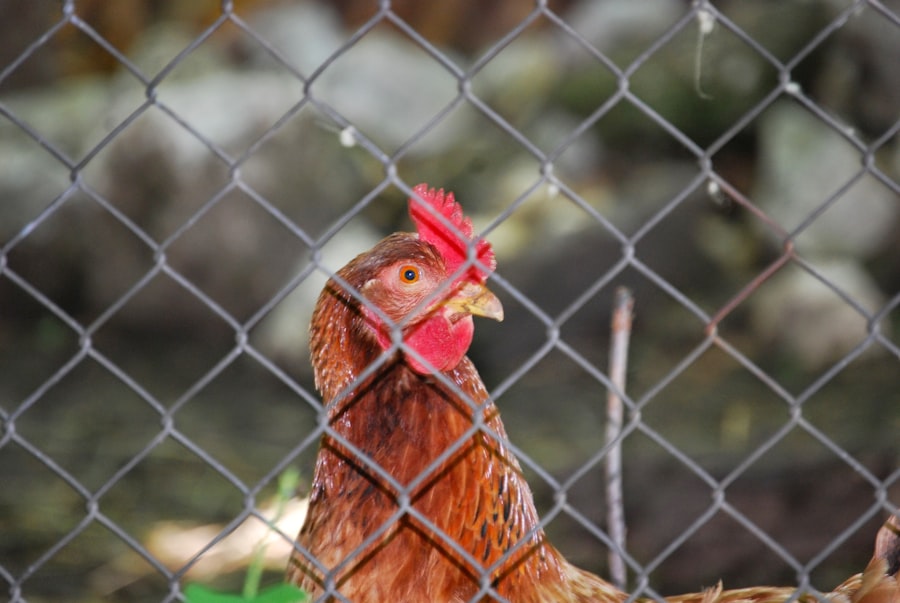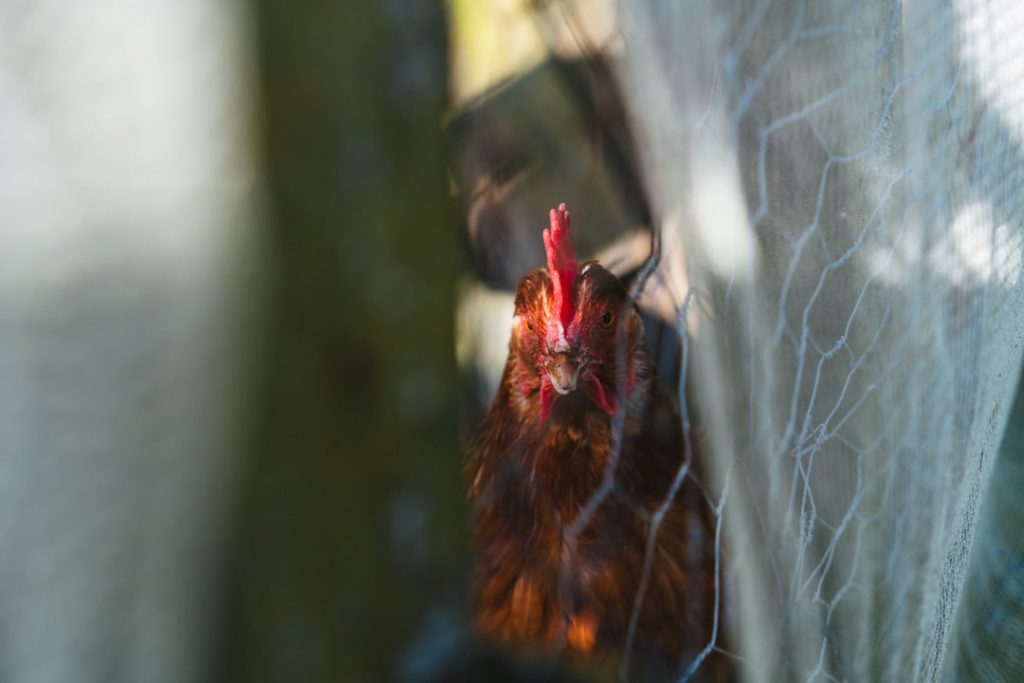Chickens are social creatures with natural foraging instincts and a propensity for exploration. They exhibit curiosity but can be easily startled by sudden movements or loud noises. These behaviors are important to consider when managing their presence in gardens or backyards.
Chickens establish a hierarchical pecking order within their flock and can be territorial. This may lead to protective behavior over certain areas and potential aggression towards other animals or humans. They are also attracted to specific plants and may cause damage by pecking at leaves or digging for insects.
Their strong sense of curiosity drives chickens to explore new areas in search of food or interesting objects, which can result in garden intrusions and plant damage. Chickens are particularly drawn to bright colors and shiny objects, further motivating them to enter gardens. Understanding these natural behaviors is crucial for gardeners to develop effective strategies for controlling chicken movements and minimizing damage to plants and flowers.
By recognizing these traits, appropriate deterrent measures can be implemented to protect gardens while accommodating the chickens’ natural instincts.
Table of Contents
- 1 Choosing the Right Pots and Plants
- 2 Implementing Physical Barriers
- 3 Using Natural Deterrents
- 4 Creating Distractions
- 5 Training and Behavioral Modification
- 6 Seeking Professional Advice
- 7 FAQs
- 7.1 What are some effective ways to keep chickens out of potted plants?
- 7.2 Why do chickens like to peck at potted plants?
- 7.3 Are there any plants that chickens are less likely to peck at?
- 7.4 How can I protect my potted plants from chickens without harming the chickens?
- 7.5 Are there any plants that are harmful to chickens if they do peck at them?
Key Takeaways
- Chickens are naturally curious and will peck at anything that catches their attention
- Choose pots and plants that are sturdy and not easily accessible to chickens
- Use physical barriers such as fences or netting to keep chickens away from vulnerable areas
- Natural deterrents like citrus peels or cayenne pepper can help deter chickens from specific areas
- Creating distractions with shiny objects or noise can divert chickens’ attention away from sensitive areas
Choosing the Right Pots and Plants
Plant Selection: A Key to Success
Plants with strong scents or prickly leaves can deter chickens from pecking at them, while plants with dense foliage can provide cover and protection for other more vulnerable plants. Choosing the right pots and plants is an important step in creating a garden that is less appealing to chickens.
Designing a Chicken-Friendly Garden Layout
In addition to choosing the right pots and plants, it is also important to consider the layout of the garden. Creating designated areas for chickens to forage and explore can help in minimizing their impact on other areas of the garden. By providing a designated space for chickens, gardeners can control their movements and prevent them from causing damage to plants and flowers.
Additional Barriers for Extra Protection
Additionally, creating barriers such as fences or hedges can further deter chickens from entering certain areas of the garden. By combining the right pots and plants with a well-designed layout and additional barriers, gardeners can effectively deter chickens from causing damage in the garden.
Implementing Physical Barriers

One effective way to deter chickens from entering the garden is by implementing physical barriers such as fences, hedges, or netting. These barriers can prevent chickens from accessing certain areas of the garden and causing damage to plants and flowers. Fences can be constructed using materials such as wood, wire, or mesh, and should be tall enough to prevent chickens from flying over them.
Hedges can also serve as a natural barrier and can be planted around the perimeter of the garden to prevent chickens from entering. Additionally, netting can be used to cover vulnerable plants and flowers, providing protection from chickens while still allowing sunlight and water to reach the plants. Implementing physical barriers is an effective way to control the movements of chickens and minimize damage in the garden.
In addition to fences, hedges, and netting, creating designated areas for chickens can also serve as a physical barrier to prevent them from entering other parts of the garden. By providing a designated space for chickens to forage and explore, gardeners can control their movements and prevent them from causing damage to other areas of the garden. This can be achieved by using chicken wire or low fences to create a separate enclosure for chickens within the garden.
Implementing physical barriers is an important step in deterring chickens from causing damage in the garden and maintaining a well-kept outdoor space.
Using Natural Deterrents
In addition to physical barriers, using natural deterrents can also help in deterring chickens from entering the garden. Natural deterrents such as predator decoys, motion-activated sprinklers, or reflective objects can discourage chickens from venturing into certain areas of the garden. Predator decoys such as fake owls or snakes can create the illusion of danger and deter chickens from approaching certain plants or flowers.
Motion-activated sprinklers can startle chickens with a sudden burst of water, discouraging them from entering specific areas of the garden. Reflective objects such as CDs or mirrors can create flashes of light that can deter chickens from approaching vulnerable plants and flowers. Using natural deterrents is an effective way to discourage chickens from causing damage in the garden.
Another natural deterrent that can be used to deter chickens is the use of strong scents or flavors. Spraying plants with a mixture of water and hot pepper or garlic can deter chickens from pecking at them due to the strong smell or taste. Additionally, planting herbs such as rosemary, lavender, or mint around vulnerable plants can create a natural barrier that deters chickens from approaching.
Using natural deterrents is a non-invasive way to discourage chickens from causing damage in the garden while still maintaining a safe and healthy environment for plants and flowers.
Creating Distractions
Creating distractions for chickens can also help in deterring them from causing damage in the garden. Providing alternative sources of food such as scratch grains or mealworms in designated areas can redirect their attention away from vulnerable plants and flowers. Additionally, hanging treats such as cabbage or lettuce on strings can provide entertainment for chickens and keep them occupied in certain areas of the garden.
Creating distractions for chickens is an effective way to control their movements and minimize damage to plants and flowers. Another way to create distractions for chickens is by providing enrichment activities such as dust baths or foraging boxes. Dust baths provide chickens with a way to clean themselves and keep parasites at bay, while foraging boxes filled with straw or wood shavings can encourage natural behaviors such as scratching and pecking.
By providing enrichment activities, gardeners can keep chickens occupied and prevent them from causing damage in other areas of the garden. Creating distractions for chickens is an important step in managing their behavior and maintaining a well-kept outdoor space.
Training and Behavioral Modification

Positive Reinforcement Techniques
By using positive reinforcement such as treats or praise, gardeners can train chickens to avoid certain areas or behaviors. For example, by rewarding chickens for staying within designated areas or avoiding vulnerable plants, they can learn to modify their behavior and minimize damage in the garden.
Deterrents and Behavioral Modification
Additionally, using deterrents such as loud noises or water sprays can discourage chickens from approaching certain areas or plants. Training and behavioral modification techniques are effective ways to control the movements of chickens and maintain a well-kept outdoor space.
Understanding Natural Behaviors
In addition to training, understanding the natural behaviors of chickens can help in modifying their behavior to minimize damage in the garden. For example, providing opportunities for natural behaviors such as scratching, pecking, or dust bathing can prevent chickens from exhibiting destructive behaviors in other areas of the garden. By understanding their natural instincts and providing outlets for these behaviors, gardeners can effectively manage the behavior of chickens and prevent them from causing damage to plants and flowers.
Effective Management of Chicken Behavior
Training and behavioral modification techniques are important tools in deterring chickens from causing damage in the garden. By combining these techniques with an understanding of natural behaviors, gardeners can create a harmonious and well-maintained outdoor space.
Seeking Professional Advice
If all else fails, seeking professional advice from animal behaviorists or poultry experts can provide valuable insights into managing the behavior of chickens in the garden. These professionals can offer personalized recommendations based on the specific needs of the garden and the behavior of the chickens. They may also provide guidance on implementing effective strategies for deterring chickens from causing damage in the garden.
Seeking professional advice is an important step in finding long-term solutions for managing the behavior of chickens and maintaining a well-kept outdoor space. In addition to seeking professional advice, joining local poultry clubs or online forums can provide access to a community of experienced chicken keepers who may have valuable insights into managing chicken behavior in a garden setting. These communities can offer support, advice, and practical tips for deterring chickens from causing damage in the garden.
By connecting with other chicken keepers, gardeners can gain valuable knowledge and resources for effectively managing chicken behavior in a garden setting. Seeking professional advice and connecting with experienced chicken keepers are important steps in finding effective solutions for deterring chickens from causing damage in the garden. In conclusion, understanding the behavior of chickens is crucial in effectively managing their movements in a garden or backyard.
Choosing the right pots and plants, implementing physical barriers, using natural deterrents, creating distractions, training and behavioral modification, and seeking professional advice are all important strategies for deterring chickens from causing damage in the garden. By implementing these strategies, gardeners can maintain a well-kept outdoor space while still providing a safe and healthy environment for both plants and chickens.
If you’re looking for more tips on keeping chickens, you might want to check out this article on A-Frame Chicken Coop. It provides valuable information on how to build a suitable coop for your chickens, which can help keep them away from your potted plants.
FAQs
What are some effective ways to keep chickens out of potted plants?
Some effective ways to keep chickens out of potted plants include using physical barriers such as wire mesh or chicken wire, placing rocks or large stones around the base of the plants, and using natural deterrents such as citrus peels or coffee grounds.
Why do chickens like to peck at potted plants?
Chickens are naturally curious and enjoy foraging for insects, seeds, and plants. Potted plants provide a tempting environment for chickens to explore and peck at, which can be damaging to the plants.
Are there any plants that chickens are less likely to peck at?
Chickens are less likely to peck at plants with strong scents or flavors, such as herbs like rosemary, lavender, and mint. Additionally, plants with prickly or spiky leaves may also deter chickens from pecking at them.
How can I protect my potted plants from chickens without harming the chickens?
You can protect your potted plants from chickens without harming the chickens by using non-toxic physical barriers, natural deterrents, and by providing alternative foraging areas for the chickens to explore.
Are there any plants that are harmful to chickens if they do peck at them?
Yes, there are several plants that are toxic to chickens if ingested, such as azaleas, rhododendrons, lilies, and daffodils. It’s important to research and avoid planting any toxic plants in areas where chickens have access.
Meet Walter, the feathered-friend fanatic of Florida! Nestled in the sunshine state, Walter struts through life with his feathered companions, clucking his way to happiness. With a coop that’s fancier than a five-star hotel, he’s the Don Juan of the chicken world. When he’s not teaching his hens to do the cha-cha, you’ll find him in a heated debate with his prized rooster, Sir Clucks-a-Lot. Walter’s poultry passion is no yolk; he’s the sunny-side-up guy you never knew you needed in your flock of friends!







